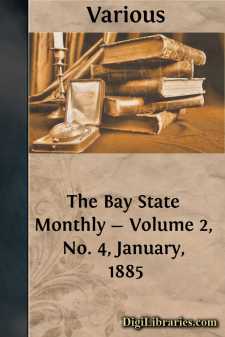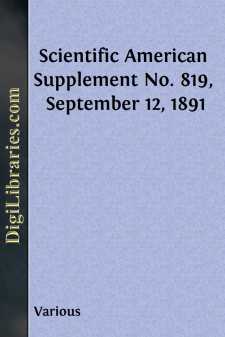Categories
- Antiques & Collectibles 13
- Architecture 36
- Art 48
- Bibles 22
- Biography & Autobiography 813
- Body, Mind & Spirit 142
- Business & Economics 28
- Children's Books 17
- Children's Fiction 14
- Computers 4
- Cooking 94
- Crafts & Hobbies 4
- Drama 346
- Education 46
- Family & Relationships 57
- Fiction 11829
- Games 19
- Gardening 17
- Health & Fitness 34
- History 1377
- House & Home 1
- Humor 147
- Juvenile Fiction 1873
- Juvenile Nonfiction 202
- Language Arts & Disciplines 88
- Law 16
- Literary Collections 686
- Literary Criticism 179
- Mathematics 13
- Medical 41
- Music 40
- Nature 179
- Non-Classifiable 1768
- Performing Arts 7
- Periodicals 1453
- Philosophy 64
- Photography 2
- Poetry 896
- Political Science 203
- Psychology 42
- Reference 154
- Religion 513
- Science 126
- Self-Help 84
- Social Science 81
- Sports & Recreation 34
- Study Aids 3
- Technology & Engineering 59
- Transportation 23
- Travel 463
- True Crime 29
The Bay State Monthly - Volume 2, No. 4, January, 1885
by: Various
Categories:
Description:
Excerpt
GEORGE DEXTER ROBINSON.
BY FRED. W. WEBBER, A.M.
[Assistant Editor of the Boston Journal.]
His Excellency George D. Robinson, at present the foremost citizen of Massachusetts, by reason of his incumbency of the highest office in the Commonwealth, is the thirtieth in the line of succession of the men who have held the office of Governor under the Constitution. In character, in ability, in education, and in those things generally which mark the representative citizen of New England, he is a worthy successor of the best men who have been called to the Chief Magistracy. His public career has been marked by dignity and an untiring fidelity to duty; his life as a private citizen has been such as to win for him the respect and good will of all who know him. He is a man in whom the people who confer honor upon him find themselves also honored. He is a native of the Commonwealth, of whose laws he is the chief administrator, and comes of that sturdy stock which wresting a new country from savagery, fostered with patient industry the germs of civilization it had planted, and aided in developing into a nation the colonies that, throwing off the yoke of foreign tyranny, presented to the world an example of government founded on the equal rights of the governed and existing by and with the consent of the people. His ancestors were probably of that Saxon race which for centuries stood up against the encroachments of Norman kings and nobles, which was led with willingness into the battle, the siege or the crusade that meant the maintenance or advancement of old England’s honor, or in the cause of mother Church, and which was possessed of that brave, independent spirit that, when the old home was felt to be too narrow an abode, sought a new-country in which to plant and develop its ideas of what government should be. However this may be it is certain that from the first settlement of the Massachusetts Bay Colony the family was always represented among the most honorable of its yeomanry, and among its members were pillars of both Church and State. His immediate ancestors, people of the historic town of Lexington, were active citizens in the Revolutionary period, and in the great struggle members of the family were among those who did brave and effective service in the cause of liberty.
George Dexter Robinson was born in Lexington, February 20, 1834. Born on a farm, his boyhood and youth were spent there, and his naturally strong constitution was improved by the outdoor exercise and labor which are part of the life of the farmer’s boy. But the future Governor did not intend to devote himself to farming. With the aim of obtaining a collegiate education he attended the Academy in his native town, and followed his studies there by further preparation at the Hopkins Classical School in Cambridge. Entering Harvard University he was graduated at that institution in 1856, and receiving an appointment as Principal of the High School in Chicopee, Massachusetts, he accepted it, filling the position with success during a period of nine years....












